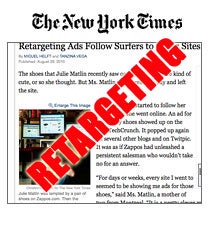 Here’s today’s AdExchanger.com news round-up… Want it by email? Sign-up here.
Here’s today’s AdExchanger.com news round-up… Want it by email? Sign-up here.
Retargeting In Focus
The New York Times Miguel Helft and Tanzina Vega take a look at retargeting of consumers through display advertising and reference the experiences of Ad Age’s Michael Learmonth and a consumer named Julia Matlin who are retargeted by Zappos ads. In discussing Matlin’s experience, The NY Times writes that after she visited Zappos site, “…Then the shoes started to follow her everywhere she went online. An ad for those very shoes showed up on the blog TechCrunch.” Read more.
TellApart Responds
Identified as a retargeting vendor in the NY Times piece, TellApart CEO Josh McFarland responded in a TellApart blog post that emphasized what McFarland sees as a need to respect the consumer. He writes, “Aside from the obvious & staid options mentioned by the Times’ commenters (opt-out, clear cookies, use Adblock), how do advertisers show respect for their consumers in this new world of display advertising? TellApart recommends and commits to the following…” See the list.
TagMan Has Good Health
TagMan has claimed another client as the company announced in a release that “Good Health Media (GHM), one of the fastest growing health ad networks, (…) has picked TagMan as its global ‘container tag.” GHM’s investors include Metamorphic Ventures, Mike Perlis of Softbank and Joe Apprendi of Founder Collective (also the CEO of Collective). Read more.
When ‘Born On’ Date Is After 1981
Loopt CEO Sam Altman tells The NY Times that if you were born after 1981, you are less likely to be concerned about your online privacy. He should know – Altman’s company provides location-based services that requires users to reveal their location. Read more.
Multi-Channel DR
In what Google’s Retail Advertising blog calls a “joint POV,” Publicis agency Razorfish and Google offer perspective on “Integrated DR Marketing for Multi-Channel Retailers.” Authors Adam Heimlich of Razorfish and Brett Goffin of Google lay down the gauntlet that offline+online is better than online alone: “Razorfish and Google believe that by taking practical steps to integrate digital into their existing acquisition and retention efforts, multi-channel retailers can quickly improve direct response (DR) results and achieve line-of-sight toward sustained advantages over pure-online competitors.” Download it (PDF).
Convertible Debt For Start-Ups
In the venture capital blogosphere, yesterday’s common thread was around whether it’s better to use convertible debt or take capital from a potential investor. GRP Partners’ Mark Suster defines the debt funding: “Convertible debt is an investment that ‘converts’ into equity in the future usually at a discount to your next funding round price and sometimes has a ‘cap’ (maximum price).” Read more about Suster’s perspective on the benefits and pitfalls.
Facebook Like Button Not Liked
ClickZ’s Christopher Heine reports that Facebook has received two L.A.-area parents are suing over the use of the “Like” button by their children. Heine writes that the parents “claim their respective adolescent children are being exploited for commercial purposes whenever they see a friend has ‘Liked’ a Facebook.com ad.” Read more.
Bing, Yahoo! Transition
Mike Shields of Mediaweek finds that agencies are impressed by Microsoft’s 12 or 13 percent search market share. For example, GroupM Search CEO says, “I think 15 percent share would have been a home run. Twelve percent a year is a solid double for me.” Read more. Shields also finds that Yahoo! is still handling its own paid search advertising as the transition to Bing and Microsoft is still ongoing.
Make My Landing Page
Landing page guru Tim Ash discusses an audience-based landing page development strategy in an article on ClickZ. He says, “Personas should be developed by observing usability tests, conducting contextual interviews (working in their actual typical environment), online surveys, focus groups, and regular interviews (where you don’t observe people working).” Read more.
Carat Predicts Industry Growth
Agency Carat announced results of its most recent advertising industry report and finds that ad industry growth is on track. “Globally, Carat now predicts 3.9% growth this year, compared to its previous outlook of 2.9%. TV spending should increase across the globe by 6.3% this year and by another 6.2% in 2011. That’s more than any medium except the Internet, which is targeted for 13.5% growth this year and 12.3% next year,” says David Goetzl in MediaNews Daily in covering the report. Read more.
Debating Privacy Standards
The Economist takes on the consumer privacy debate – literally – as it invites different sides to discuss solutions and challenges such as ad industry self-regulation and the changing, more social, online world spurred by Facebook. Jim Harper of Cato Institute argues against more regulation saying, “The internet is not for couch potatoes. It is an interactive medium. While internet users enjoy its offerings, they should be obligated to participate in watching out for themselves.” Read more.
The Three CEO Traits
Venture captalist Fred Wilson identifies what he sees as key traits in any CEO who should be expected to successfully lead a company. He ends up quoting a VC friend who says, “A CEO does only three things. Sets the overall vision and strategy of the company and communicates it to all stakeholders. Recruits, hires, and retains the very best talent for the company. Makes sure there is always enough cash in the bank.” Read more.










